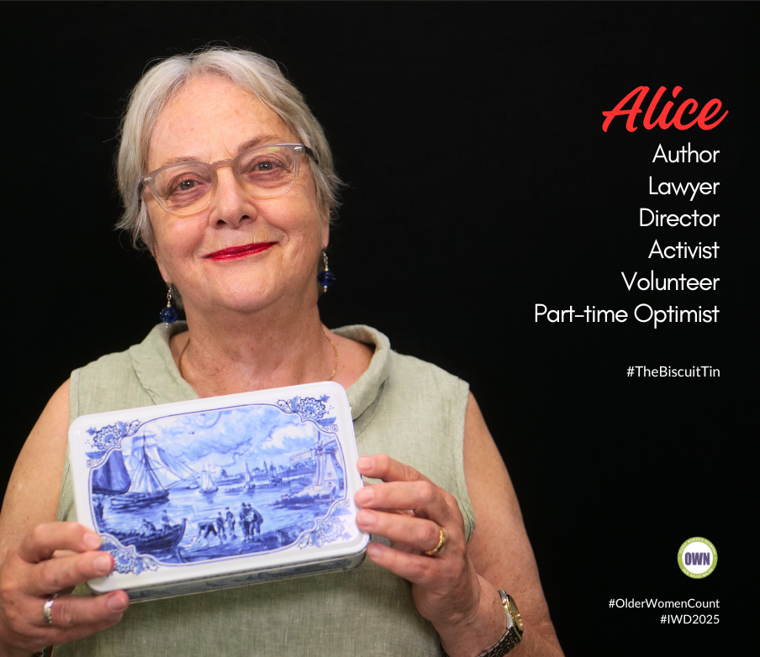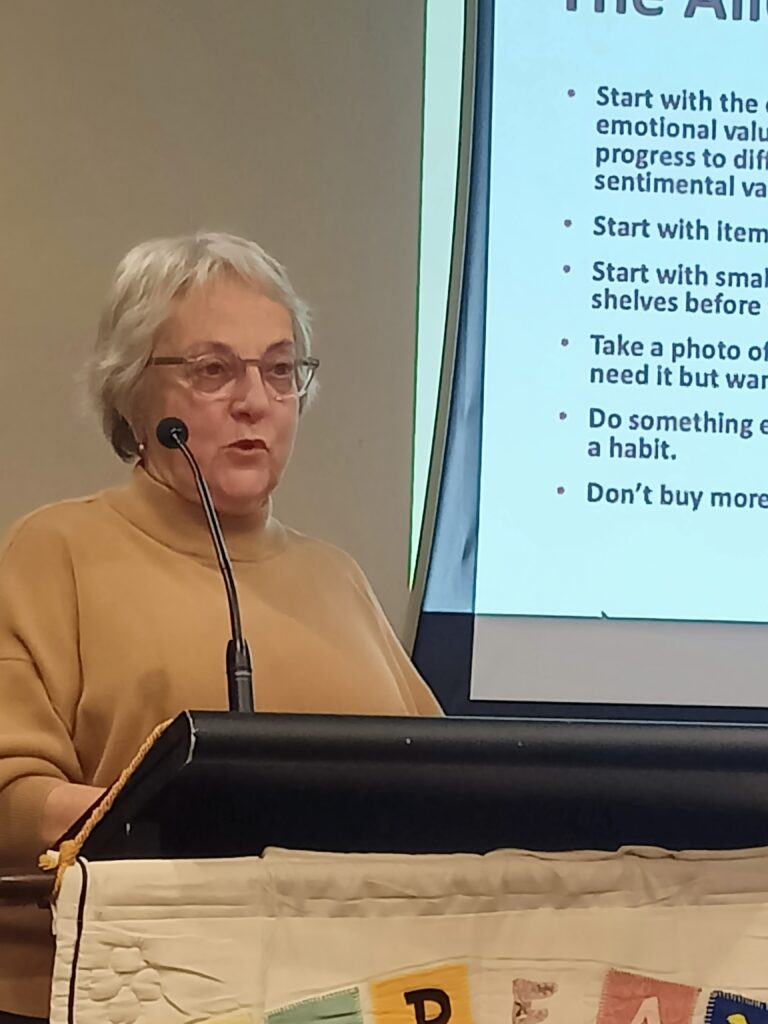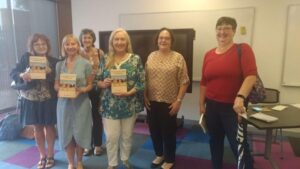Often older people feel that their voice is not being heard. At this COTA event, Alice is giving a few tips at being a more effective advocate.

A site on retirement, life changes and planning for your future.
Often older people feel that their voice is not being heard. At this COTA event, Alice is giving a few tips at being a more effective advocate.


Giving a talk at the Nepean-Hawkesbury VIEW Club on 17 June 2024.

Join me and my co-host Amanda Armstrong as we take you through this series of six podcasts which can help you to be better prepared for those unexpected life events.
Podcasts can be found on YouTube.
This series is presented on behalf of the Older Women’s Network.
Death is of course, inevitable, but often it is unexpected. Most of us would rather not think too much about it. But planning for the unexpected can be liberating. It allows you to enjoy life because you have removed a future burden for yourself and your loved ones.
This new series from OWN presented by family lawyer Alice Mantel will take you through what you need to organise before you die, from writing a will, family conversations and decluttering. It can be a baffling area, and easy to put in the too hard basket for now. This practical and reassuring series will break down the steps and give you tips to approach planning for the unexpected in a positive and proactive way.
https://www.youtube.com/watch?v=C9TkNtu2WMA&pp=ygUacGxhbm5pbmcgZm9yIHRoZSB1bmV4cGVjdGU%3D
https://youtu.be/trNaxaNIjJA
A recent survey says there are three resources you need to better navigate getting older.
2. Good information. Having access to quality information about ageing preparedness is essential. It assists people to know what to expect from their ageing bodies, what lifestyle changes they may need to consider as they age and negotiating social support systems.
3. Emotional resilience. Developing a positive attitude to ageing better equips people from the effects of future health shocks, finance shocks, dependency, or decline.
In our youth-oriented culture, ageing is associated with inevitable decline and burdensome dependency. These powerful negative stereotypes are internalised throughout our lives, which results in many of us being unwilling to think about being an older person or planning for such an undesirable future.
The 2022 National Seniors Social Survey asked its members and associated network members over 50 years about their ageing-related preparedness. About 68 percent of the 3,412 respondents felt they were prepared to some extent to deal with the ageing process. Most of these respondents reported there were some positive aspects to ageing, but people experiencing poor health were 30 percent less likely to feel prepared.
Both individual characteristics and societal supports were relevant to how people prepared for getting older. People who had experienced health changes in family members were far more likely to be interested and better informed about how ageing might affect them personally. While poverty and disadvantage were more likely to impact people’s access to resources such as healthy food or appropriate medical care that assisted better ageing.
Domains of preparedness were:
• Preparing for changes in health and bodily abilities: respondents varied between acceptance of physical decline and being able to manage that decline, and fear of decline.
• Preparing accommodation: most respondents acknowledged the possible actions needed to remain at home with age, while fear of residential aged care underpinned the second most prevalent views. Renters were most concerned about their future.
• Preparing finances: while some respondents linked their feeling of financial security to having worked hard during their life, the second most prevalent view expressed concern about money, with some consequently being unable to prepare adequately for ageing.
Those feeling prepared for ageing frequently had very positive life-scripts reflecting acceptance, empowerment and capacity to manage ageing-related health changes. Not surprisingly, unpreparedness was represented by life-scripts focused on sudden or unexpected health declines or lack of resources and support.
To access the detailed survey, visit National Seniors, https://nationalseniors.com.au/uploads/NSA-Ageing-Preparation-report-FINAL.pdf
Scanlan Carroll Lawyers, Carol Pagès
If you have recently separated, your focus will likely be on what to do about the property you have with your ex partner, and arrangements for your children.
So why do you need to think about your Will?
If you have a Will, it may be that each of you and your ex partner have left everything to each other, and then to your children.
If you are separated, it is important to take the time to review all of your estate planning documents – this includes your Will, your Powers of Attorney, and your Binding Death Benefit Nomination of your superannuation fund.
Each of these documents is explained below:
Your Will – your Will sets out how you would like your assets distributed when you die and who is responsible for carrying out your wishes. You can also include clauses such as your nominated guardian for children under 18, and specific gifts that you would like to make. In your Will you specify who will be your executor. Your executor stands in your shoes when you die, and they will carry out your wishes by calling in your assets and distributing same to your chosen beneficiaries.
Enduring Power of Attorney – While you are alive, your attorney is able to stand in your shoes and carry out financial transactions on your behalf using the power – this can be buying or selling property on your behalf if you are away on holidays, transacting on your bank account paying your bills for you, and so on. Your nominated attorney can also make personal care decisions for you – such as choosing a care facility if you are unable to look after yourself, or limiting or restricting a person from visiting you if they consider this is not in your interests.
A separate medical decision maker (which can be the same person) will be able to make medical decisions on your behalf, such as consenting to surgery if you are unable to. As the powers are enduring, they continue even if you later suffer an illness or injury which means you are unable to make decisions for yourself.
Binding Death Benefit Nomination (BDBN) – many people have significant balances in superannuation and also life insurance policies attached to their funds. As part of your estate planning process, we provide you with advice about your BDBN as superannuation is generally considered to be ‘outside’ of your estate and what is covered by your Will. It is important that this valuable asset is passed on to your loved ones in the way that you intended.
Why is this important?
Separation does not trigger the end of your existing Will, Powers of Attorney or BDBN. Many people are surprised to learn that divorce does not invalidate your Will. Divorce revokes a gift to your former spouse or appointment as your executor, and remarriage can invalidate your Will save for references made to your current spouse.
What if I don’t have a Will?
If you don’t have a Will, your assets will be passed on to your relatives according to the rules of intestacy. The rules in Victoria are that if you die, your estate goes to:
Your spouse or domestic partner if you have no children;
Your spouse or domestic partner, if you have children with that partner;
If you have children to a previous relationship, your spouse will receive a statutory legacy (currently $480,700), your personal possessions, and 50% of the balance of your estate. Your children will equally share the remaining 50% of your estate.
Case study – who inherits?
Alex separated from Danielle three years ago. They were married however had no children. They were able to resolve their family law property division fairly amicably, and finalized their family law case with Consent Orders dividing their property.
Alex and Danielle prepared their Wills when they were first married 10 years ago, each leaving their estate to the other.
Alex has re-partnered with Mary, and they have been together for 20 months.
Alex and Danielle haven’t yet filed for divorce as they have not gotten around to it yet. Alex has the forms on the kitchen table to sign.
Alex tragically dies before signing his divorce form.
Who do Alex’s assets go to………..?
Depending on a number of factors – it’s Danielle – his former wife.
The gifts to Danielle in Alex’s Will are not revoked as they are not divorced.
If Alex owned property such as a house with Mary, and the house was in joint names – the house would be outside of Alex’s estate and pass straight to Mary.
What if Alex didn’t have a Will?
Based on the length of the relationship with Mary (along with several other factors which would need to be taken into account under the Family Law Act 1975 (Cth)), Mary is not likely to be considered a spouse.
Danielle is still Alex’s legal spouse, as they are not divorced, so Danielle receives Alex’s estate.
Summary
Mary may have grounds to make a claim in either scenario, but this can be a long and expensive legal process which no one wants to go through after the loss of a loved one.
The above example shows that how an asset passes on after death can depend on a number of factors. To ensure that your wishes are as you intended, it is important to obtain advice in relation to your family law and estate planning matters.
This is important at separation, and the time following separation – for example, when you re-partner, it is worth considering the impact of your new relationship and property ownership upon your children, and your new partner.
Why is retirement different for women? Women retire with about 60% of the superannuation funds that men have. They live 5 years longer and they are far more reliant on the aged pension. On the plus side – women are more likely to retain their friendship networks, more likely to be the principal carer for their partner, their parents and their grandchildren, as well being more likely to volunteer to help others.
Listen to my wide-ranging discussion with community radio 2RDJ broadcaster, Neil Lithgow about women and retirement. Listen here:
By simply spending 30 minutes of your time answering these questions about yourself, you can make a contribution to research about ageing and Australian women.
What is AgeHAPPY?
The Healthy Ageing Project Population Youth-senior (AgeHAPPY) is an online heath survey for Australians. The Healthy Ageing Project (HAP) mission is to improve the understanding of health across a lifespan to promote healthy ageing and prevent disease.
This round of the survey commenced in 2020. It started with a pilot study called HAP. Data on self-reported health, lifestyle, mood, and vascular risk factors is being collected from male and female participants aged 18 years and over. AgeHAPPY is a continuation of the Women’s Healthy Ageing Project (WHAP).
WHAP commenced in 1990 as a study examining the health of Australian women from midlife (then aged 45-55 years) before the menopausal transition and into ageing. The study has almost 30 years of data on mood, dietary intake, risky behaviours, physical activity and social connectedness among other factors. WHAP continues to follow up these women, who are now all aged over 70 years. The children of the original participants have now joined the study as of 2021 commencing the WHAP generations study.
AgeHAPPY is a study into the lifelong effects of lifestyle and habits on health and the progression of ageing. Everyone over 18 years of age can participate in the online health questionnaire. This research ultimately contributes to promoting healthy ageing in Australia and to improve the wellbeing of all Australians.
Chronic disease is the largest cause of death and disability in Australian society and throughout the western world. The information collected will enable greater understanding of the impact of social and behavioural factors on health and influence policies toward better prevention and early detection of health issues, including Parkinson’s and Alzheimer’s disease.
Most studies on “ageing” are usually limited to the elderly. HAP defines ageing as a phenomenon that occurs continuously throughout all stages of life – and presents its health challenges at all ages. Many studies show that indicators for chronic disease occur years before onset.
Through this online health survey, HAP can collect valuable demographic, clinical, behavioural and lifestyle data which allows them to analyse the impact of factors on health and ageing at every age.
Get involved in the AgeHAPPY study
The first section of the study is an online questionnaire covering areas such as demographic information, general health history, family health history, mood, quality of life, physical activity, sleep, diet, alcohol intake, smoking, physical function, social relationships, and negative life events.
The second section is a cognitive component which tests thinking skills, a bit like a brain game. A participant will be invited to complete the online cognitive testing from the Healthy Brain Initiative – Brain Health Registry (HBI-BHR). The Brain Health Registry is a web-based study that enables researchers to efficiently identify, assess and monitor the brain changes associated with the progression of neurodegenerative diseases and brain ageing more efficiently.
In 12 months’ time, HAP will contact you to complete a follow-up online questionnaire.
To participate, please follow the link:
https://medicine.unimelb.edu.au/research-groups/medicine-and-radiology-research/royal-melbourne-hospital/healthy-ageing-program/healthy-ageing-project
However you describe it, being poor, disadvantaged, or living in a low socioeconomic area is more likely to make you more susceptible to preventable chronic diseases such as heart disease, arthritis and diabetes.
Australia’s Health Tracker by Socioeconomic Status 2021 reports on the health status of Australians based on their socioeconomic standard which the study has found has a major impact on people’s health. Families and individuals with limited resources not only have more chronic disease, they are at greater risk of dying prematurely as a result of chronic health conditions. People living with mental ill-health are less likely to participate in employment, which in itself, is associated with an improvement in general mental health levels.
The ten million people living in the 40% of communities with lower and lowest socioeconomic status have much higher rates of preventable cardiovascular diseases, cancer, diabetes or chronic respiratory diseases than others in the population. These communities also have the highest rates of suicide throughout the nation.
Risk factors that are likely to contribute to this higher rate of illness and premature death include:
• Physical inactivity
• Lifetime alcohol consumption
• Daily tobacco use
• Unemployment as a result of mental health issues.
These health disparities within the Australian population are persistent despite considerable policy reform and efforts to improve services in recent decades. The targets for a healthier Australia were developed by the Australian Health Policy Collaboration, a national network of leading health experts and organisations. The Collaboration has worked with the support of the Mitchell Institute, Victoria University since 2014 to influence public and policy awareness and action to reduce high rates of preventable chronic disease in the Australian population.
The report sets health targets for medical conditions such as:
• Obesity – Obesity is a risk factor for cardiovascular disease, high blood pressure, type 2 diabetes, asthma, back pain and some cancers.
• High cholesterol – High levels of low-density lipoprotein cholesterol are a risk factor for heart disease. National data from 2011-12 is the most recent available data and indicated that close to one-third of all socioeconomic groups were estimated to have high cholesterol levels.
• High blood pressure – Rates of reported high blood pressure are relatively consistent across socioeconomic groups. High blood pressure is often caused by poor diet, physical inactivity, obesity and excessive alcohol consumption. It is a risk factor for chronic conditions including stroke, heart diseases, and chronic kidney disease
• Diabetes – Hospitalisations and deaths related to diabetes are, respectively, 2 and 2.3 times as high in the lowest socioeconomic communities compared to the highest.
Australia’s Health Tracker by Socioeconomic Status 2021 report, The Mitchell Institute at Victoria University. Australia’s Health Tracker by Socioeconomic Status 2021 report
One rainy afternoon at the Dennis Johnson library, Stanhope Gardens. This group of women had plenty of experiences to discuss. 